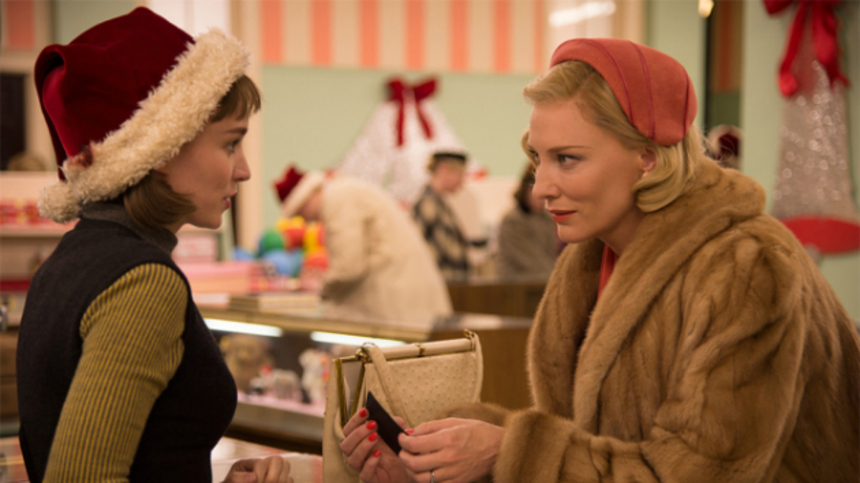Cannes 2015 Review: CAROL, Tremendously Accomplished, Yet Cold

The same-sex melodrama presents an interesting case where form and content match up a little too well. For Carol is a story about characters suffocating in their own skin, trapped by the trappings of polite society and moral expectations. Characters who pour the greatest meaning into furtive glances and casual brushes, stealing quiet moments from the crowds around them, stepping out from their own normal lives. So it is altogether fitting, ironic even, that the film gets all the details and minutiae right, but never quite gets them to coalesce into an emotionally satisfying whole.
Cate Blanchett plays Carol. It is Christmas time, 1952, when she wanders into an upscale New York City department store and spots sweet shop-girl Therese. Or rather, is it Therese that spots her? Whatever the case may may, it is love -- or smitten infatuation -- at first sight, and that goes for both parties. Carol is the older one, a 40ish socialite coming out of a fizzled marriage. Therese is a generation younger, a fledgling photographer in her early 20s, trying to make it in the big city. Both are swept away by shared attraction that dare not speak its name, though Carol, whose previous dalliances with women led to her marriage's collapse, has a better understanding of how to proceed.
Rooney Mara's Therese, the ingenue partner, is no ingenue. She gamely accepts all of Carol's advances, returning the gloves left behind on her counter after their initial encounter, and then accepting Carol's escalating invitations, first to lunch, then to her house, and finally to join her on the road. For what sounds like a whirlwind start, theirs is a studiously chaste relation. Indeed, they don't even share a kiss until well over an hour into the film.
There is a reason for that, of course, and its called 1952. Neither Carol nor Therese nor we the viewers are ever allowed to forget what a different world their love is born into. Hanging over them at all times is the knowledge that to express their feelings with words, or worse yet, with physical affection, would be to risk everything. For Carol, that means custody of her daughter, a terrifying possibility and a very real threat thanks to her spiteful ex-to-be and his army of lawyers, all armed with moral deficiency clauses. For Therese, it is sheer fact that to love a woman is to be considered morally deficient.
But their fires still burn. And that first hour of the film is filled with the most acute tension, with mountains of emotion conveyed by the words unsaid, by Carter Burwell's looping score, by cinematographer Ed Lachman's Edward Hopper-like compositions. Most of all it is conveyed by actors Blanchett and Mara's performances: their tightly wound choreography and their pantomimes of polite respectability, completely belied by the hunger in their eyes. Both do career-best work here, and I should imagine we will be seeing a great deal of them come awards time.
Unfortunately, the magnificent mood Haynes creates, and the devotion of his stars, cannot overcome what amounts to less than stellar source material. The film is an adaption of the 1950's paperback The Price of Salt, and its pulp roots show, particularly in the second half. Haynes is famous for turning genres on their head and examining them upside down, but he's not really commenting on the pulp genre here, instead trying to deepen characters within it. (Worth noting: Haynes came late to the project, and the screenplay is wholly credited to playwright Phyllis Nagy). It works at the start, but the screenplay simply doesn't hold up the A-game brought by everyone else. Instead of enriching the pulpier elements, they are just made to stick out.
These are still pretty minor problems -- frankly, it's mostly my own way to figure out why it didn't quite connect. Because overall, Carol is a tremendously accomplished film, and one I respect a great deal. Unlike Therese and Carol, however, I didn't fall in love. I'll have to settle with just being friends.
Carol
Director(s)
- Todd Haynes
Writer(s)
- Phyllis Nagy (screenplay)
- Patricia Highsmith (novel)
Cast
- Cate Blanchett
- Rooney Mara
- Kyle Chandler
- Sarah Paulson

Do you feel this content is inappropriate or infringes upon your rights? Click here to report it, or see our DMCA policy.






